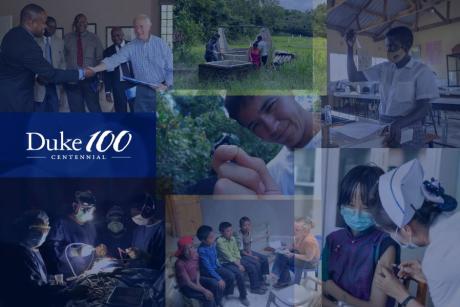Three teams of Duke faculty researchers from global health, medicine and engineering have been awarded funding to begin new studies on cancer detection, diagnosis and treatment in resource-limited settings. The funding is part of an initiative by the Duke Global Health Institute and the Pratt School of Engineering to promote interdisciplinary work in global cancer.
The funding was awarded to Nelson Chao, Ashutosh Chilkoti, Walter Lee, Robert Malkin, Nimmi Ramanujam, John Schmitt and Peyton Taylor. They will each be working on the early detection and diagnosis of various cancers across East Africa and Asia.
Cancer is increasingly claiming the lives of millions of people around the globe, with 70 percent of deaths occurring in low- and middle-income countries. Thirty percent of those deaths are preventable, and with more opportunities to jumpstart new work in cancer research, like those at Duke, we can address the complexities of the disease and improve the odds.
Robert Malkin, professor of the practice of biomedical engineering at Pratt, and Walter Lee, co-director of the head and neck program at the Duke Cancer Institute, will work with Vietnamese partners at Ha Noi Medical University to explore the feasibility of using a low-cost, portable, fiber optic nasolaryngoscope device for the rapid screening and early detection of head and neck cancers in Vietnam. These types of cancers are often difficult to diagnose due to complex anatomy, lack of equipment and limited expertise of health care providers.
“We are very grateful for the support from Pratt and DGHI,” said Lee. “This award enables our international, interdisciplinary team to not only provide needed resources through these scopes, but also build on the knowledge and expertise of Vietnamese health care providers. Our hope is that this pilot in Vietnam would be the model to help address the cancer burden in other low- and middle-income countries.”
Ashutosh Chilkoti, professor of biomedical engineering at Duke, is working with Nelson Chao, professor of medicine, immunology, pathology and global health, as well as partners in Africa and Asia, to field test the feasibility of a simple point-of-care test to diagnose prostate and liver cancers in Moshi, Tanzania and Hangzhou, China. The test is optimal for resource-limited settings because it is inexpensive, uses a single drop of human blood, and samples can be stored without refrigeration. The test may also be useful for determining the effectiveness of treatment.
"These funds, to validate our technology, are invaluable as they are difficult to get from other, more traditional sources of funding,” said Chilkoti. “It will allow us to put our new point-of-care test through its paces in a low- and middle-income setting with clinical samples."
Nimmi Ramanujam, professor of biomedical engineering and global health, John Schmitt, professor of obstetrics and gynecology, and Peyton Taylor, consulting professor of obstetrics and gynecology, will work with partners at Kilimanjaro Christian Medical Center in Tanzania to integrate the diagnosis and treatment of cervical pre-cancer in one patient visit. They will test a device called a colpospectroscope in patients with cervical cancer. Using this technique, cervical abnormalities can be seen and diagnosed “on the spot” in a single visit. Otherwise, the standard practice of regular pap smear screenings may not be practical in low- and middle-income settings where there is limited infrastructure and resources, and where patients are lost at each level of care.
“Being a recipient of this award means a great deal more than just the monetary amount with which it is associated,” said Ramanujam. “This collaborative effort between Pratt and DGHI will allow us to create an essential infrastructure required of such a rigorous international clinical study like ours.”
Learn more about this and other DGHI funding opportunities available to Duke faculty.



